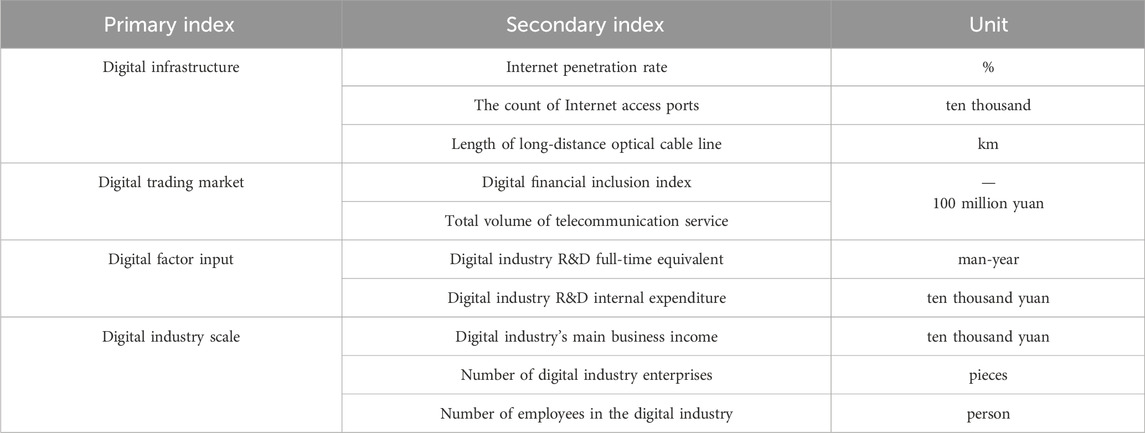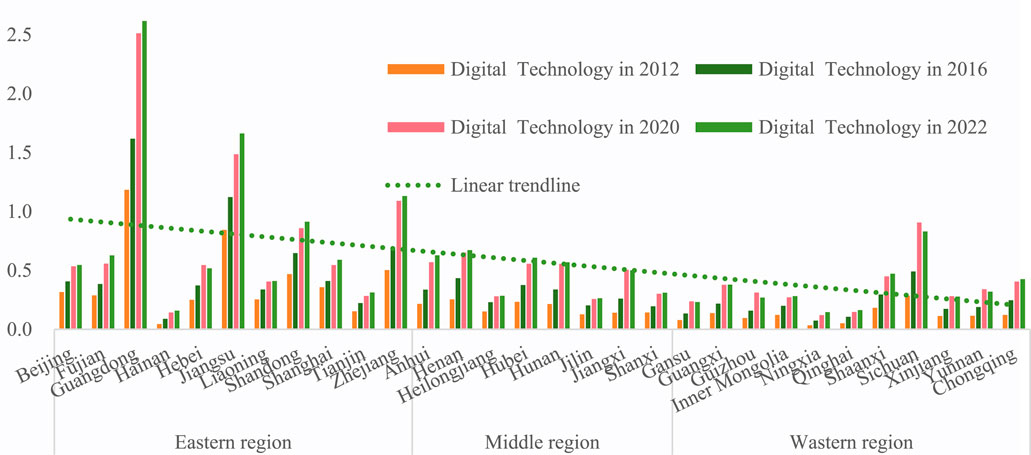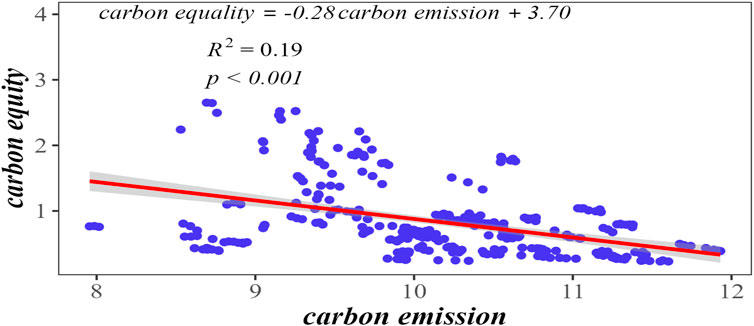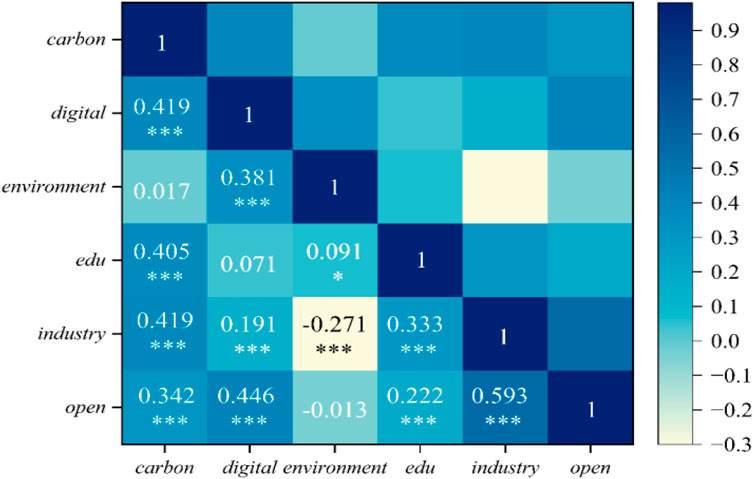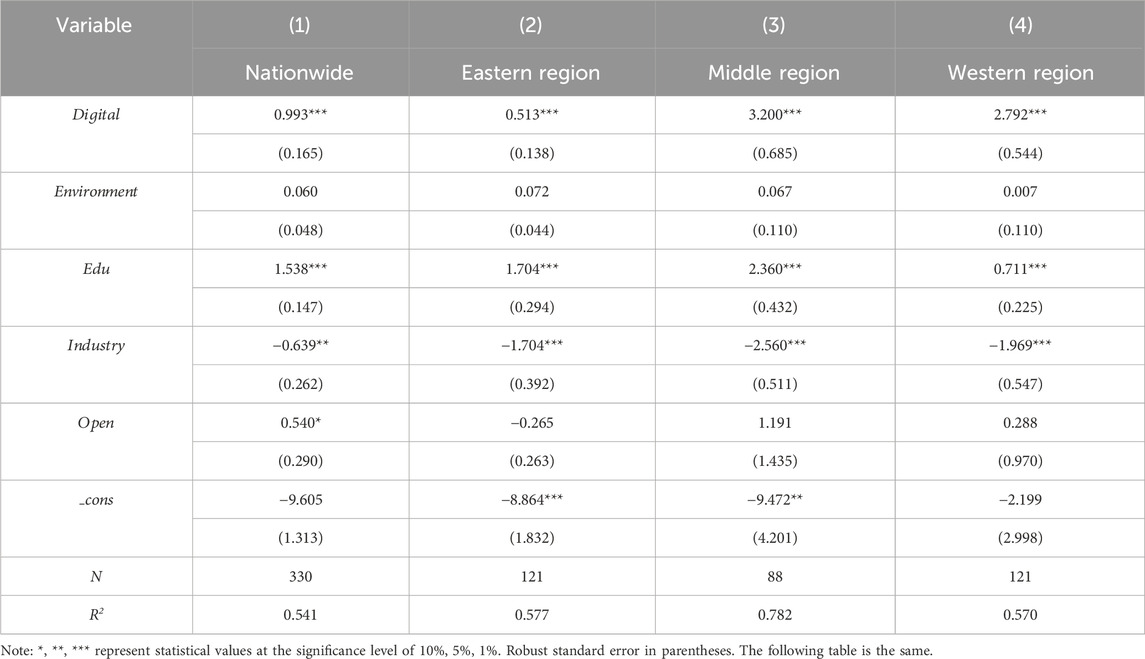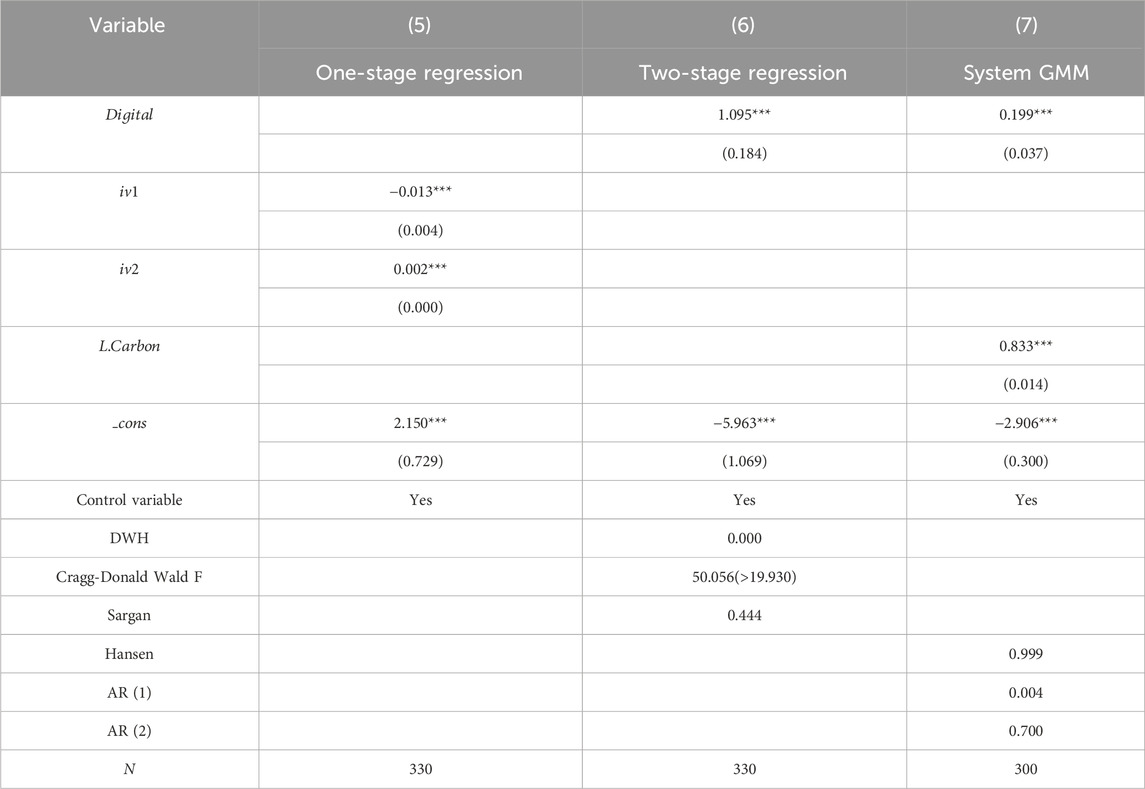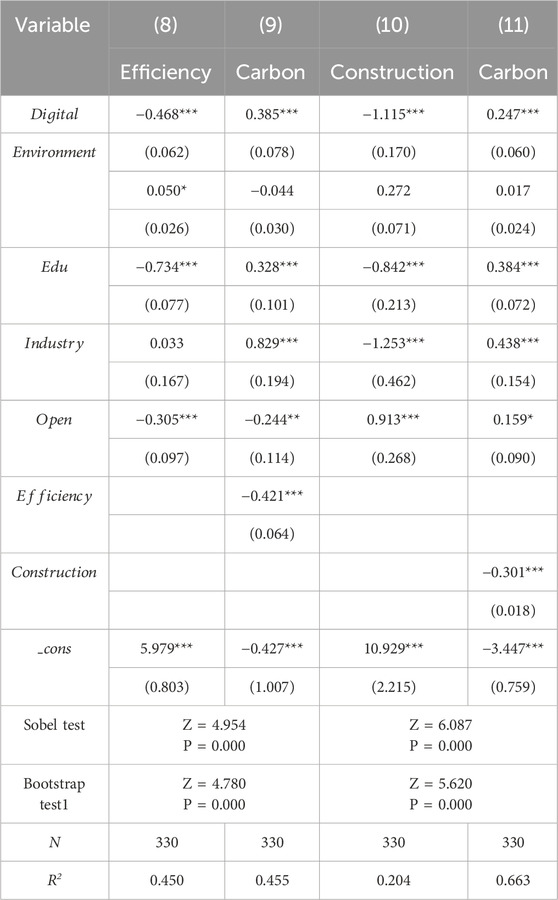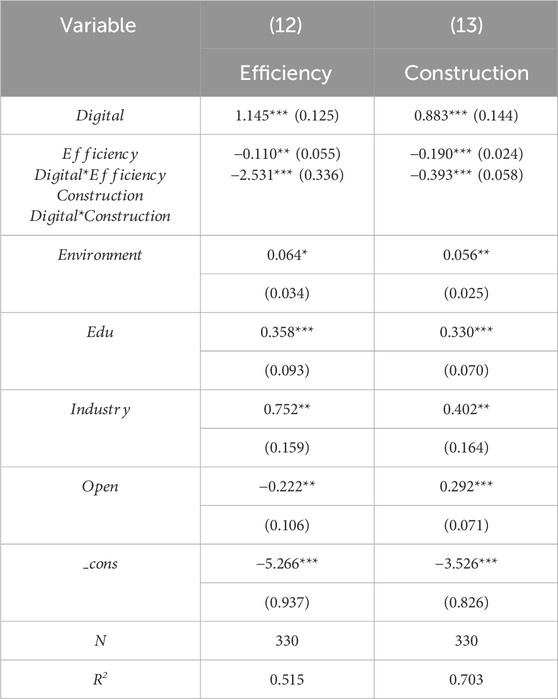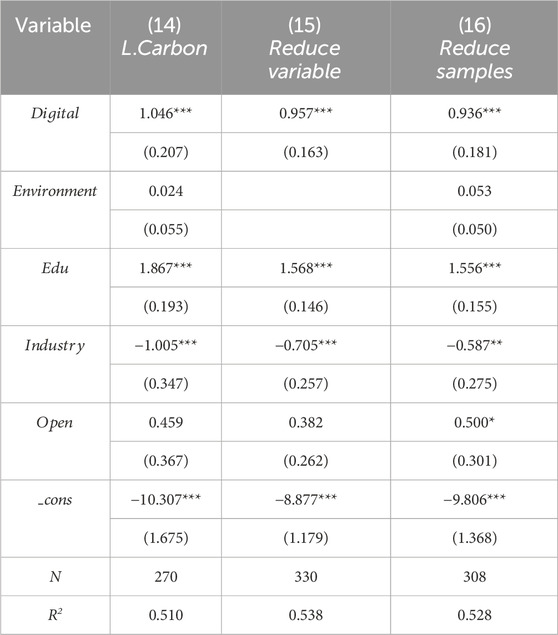- 1Harbin Institute of Technology, Harbin, China
- 2China State Shipping Corporation Limited, Shanghai, China
- 3School of Management, Shandong University of Technology, Zibo, China
- 4School of Economics and Management, Weifang University of Science and Technology, Weifang, China
Actively leveraging the advantages of digital technology in promoting carbon equity development has provided a feasible solution for achieving ecological common prosperity. Based on provincial panel data from China spanning 2013 to 2023, this study investigates the intricate impacts of digital technologies on carbon equity utilizing fixed effects, mediation, and moderating models. The benchmark regression results indicate that digital technology has a significant positive effect on carbon equity, with heterogeneous effects across regions: “middle region > western region > eastern region”. The mechanism effect study indicates that digital technology can indirectly promote the realization of carbon equity by reducing energy intensity and optimizing the energy structure. The moderating effect study reveals that both energy intensity and energy structure negatively moderate the relationship between digital technology on carbon equity. The research findings extend the theoretical boundaries of how digital technology can contribute to the construction of carbon equity, while providing certain reference value for the implementation of ecological civilization construction and the high-quality development of the “carbon neutrality” strategy in a manner that suits local conditions.
1 Introduction
The international community has gradually reached a consensus that achieving carbon emission reduction is a core measure for alleviating global warming and maintaining the stability of the Earth’s ecosystem (Tian et al., 2021). Effective carbon reduction requires simultaneous progress in both the “carbon quantity reduction” and “carbon equity” goals. Nevertheless, current research and policy implementation have predominantly emphasized quantitative targets while largely overlooking the critical dimension of carbon equity development. Carbon equity, a concept originated from the theory of environmental justice theory (Zhang and Huang, 2023), emphasizes the fair distribution of carbon emission rights and responsibilities, aiming to ensure that entities such as countries, regions, enterprises, and individuals, in the process of responding to climate change, follow specific fair principles. They should not only bear a reasonable share of carbon emissions but also enjoy balanced development opportunities (Jia, 2023; Lin and Zhao, 2023). From 2013 to 2022, the average value of the overall Gini coefficient of China’s carbon emission intensity was approximately 0.291, indicating persistent and significant distributional imbalances. The uneven distribution of consumption, wealth and income allocation (Tian et al., 2025a), as well as the financial situation of the elderly and their lifestyles related to direct and indirect energy consumption, has resulted in an inequitable allocation of carbon emission responsibilities across socioeconomic groups. This disparity significantly exacerbates existing inequalities. Carbon equity plays an important role in achieving fair and just climate mitigation (Hubacek et al., 2017) and ecological common prosperity. From an international perspective, advancing carbon equity enables developed nations to exercise leadership in climate governance while fostering global collaboration in green technology transfer and low-carbon industrial transformation. This approach not only stimulates economic revitalization but also enhances their international reputation as responsible climate actors. For developing countries, carbon equity enables them to obtain technological sharing and financial support, helping them break away from traditional high-carbon development paths and accelerate the transition to a green and sustainable model, achieving global collaborative emission reduction and mutual benefit (Wang et al., 2021).
Therefore, scholars have actively explored how to measure and promote carbon equity. First, in terms of measurement and evaluation, existing studies predominantly employ fundamental principles including economic capacity, responsibility sharing, interpersonal equity, and ecological justice. These studies typically utilize statistical metrics such as the Gini coefficient (Zhu et al., 2020), Theil index (Tian et al., 2021), and Kakwani index (Seriño, 2020) to quantitatively assess emission distribution fairness (Zhang and Huang, 2023). However, such studies often focus on exploring the construction of fair and efficient distribution plans and lack empirical research that conducts quantitative tests to analyze their driving mechanisms. Therefore, based on the research of scholars Liu and Xu (2024), this study constructs a comprehensive carbon fairness indicator evaluation system by comprehensively considering aspects such as carbon emission responsibility, carbon reduction potential, carbon reduction capacity, and carbon emission economic efficiency. Secondly, scholars have pointed out that measures such as rational allocation of carbon emission responsibilities (Wang and Lin, 2023), narrowing the income gap among residents (Wu and Chen, 2023), and establishing differentiated carbon pricing mechanisms (Fan et al., 2023) are effective ways to promote the construction of carbon equity. However, despite these insights, research on the role of digital technologies in facilitating carbon equity remains notably underdeveloped.
We are in the wave of the digital age, digital technology is like a powerful torrent, profoundly reshaping every level of the social economy (Wang et al., 2024), digital technology may play a significant role in facilitating the construction of carbon equity. Firstly, within the energy sector, digital technologies contribute to the advancement of smart grids, allowing for accurate energy distribution and efficient usage by leveraging real-time data monitoring and analysis capabilities (Pettifor and Wilson, 2020; Huang and Chen, 2024). They minimize energy transmission losses and wastage, effectively cutting down carbon emissions, and thereby enhancing the efficiency of carbon distribution. Secondly, in industrial manufacturing, digital production technologies and intelligent manufacturing systems optimize production efficiency and energy productivity through precise control of material and energy inputs (Li et al., 2025; Wu et al., 2023). These technological advancements significantly reduce per-unit carbon footprints while ensuring equitable carbon quota allocation among competing enterprises. Thirdly, in the field of transportation, digital platforms integrated with intelligent transportation systems enable optimized traffic flow management, enhance intelligent operation of new energy vehicles, and facilitate innovative shared mobility solutions (Buhe and Chen, 2021). These technological integrations provide an effective pathway for reducing carbon emissions in transportation systems. Finally, in the operation of enterprises, the deep integration of digital technology with the industrial structure creates new opportunities for the innovation efficiency of high-tech enterprises to soar (Li et al., 2022), and helps enterprises achieve low-carbon innovation and carbon reduction. Digital technology has fully permeated the entire chain of enterprises’ products, services and production and operation (Yuan and Gao, 2022), which not only can enhance innovation performance and competitiveness, but also can prompt enterprises to incorporate environmental protection and sustainable development into their economic goals. Through the application of low-carbon technologies and process optimization, emissions can be reduced, ultimately facilitating the realization of carbon equity.
While digital technology demonstrates significant theoretical potential for advancing carbon equity, its practical efficacy remains insufficiently examined through empirical research. Consequently, a pertinent question arises: Can digital technologies facilitate the attainment of carbon equity? If so, what are the transmission mechanisms through which digital technologies impact on carbon equity? Additionally, given the regional heterogeneity within China, this study examines whether digital technologies demonstrate differential effects on carbon equity across regions. This study endeavors to address these questions, investigate the effects of digital technologies on carbon equity, elucidate the unique role of digital technologies in this realm, and offer insights to inform the development of tailored policies. Such efforts will contribute to both theoretical research and practical exploration of global climate governance and sustainable development. In conclusion, current research on digital technology and carbon equity reveals three critical gaps. Firstly, the profound relationship between digital technology and carbon equity has received limited attention, leading to a dearth of empirical evidence. Secondly, existing studies examining the impact mechanisms of digital technologies on carbon equity have largely overlooked the mediating role of energy transition. Thirdly, considering the network characteristics inherent in digital technology within the digital economy, further discussion is required regarding the regulatory effects between digital technology and carbon equity.
This study, differing from prior research, intends to explore in greater depth the complex influence of digital technology on carbon equity, presenting three marginal contributions. First, this study establishes an innovative link between digital technology and carbon equity, delving into their deep-seated connection and broadening the horizons of digital carbon reduction research. Second, from an energy transition perspective, this study investigates the mechanisms by which digital technology influences carbon equity through dimensions such as energy intensity and structure. It offers theoretical underpinning for comprehending the efficacy of digital technology in advancing carbon equity. Third, given the significant heterogeneity across different regions, it is imperative to explore the differentiated moderating effects between digital technology and carbon equity.
The structure of the rest of this study is outlined as follows: In the second section, we will elaborate on the theoretical framework and the research hypotheses formulated in this investigation. The third section outlines the model construction, measurement of relevant variables, data sources, and provides descriptive statistics. The fourth section offers a thorough examination of the empirical findings. Lastly, we present the research conclusion, policy implications, and future directions of this study.
2 Mechanism analysis and research hypothesis
2.1 Direct influence mechanism and research hypothesis
The core issue to realizing carbon equity is emission reduction sharing, which includes two parts: carbon allocation and carbon reduction. This study argues that the unique dynamic accuracy, full penetration, and high transparency of digital technology can directly affect the realization of carbon equity from the two aspects of carbon allocation optimization and carbon emission reduction.
On one hand, drawing from the theory of digital carbon management, digital technology can facilitate a rational carbon allocation scheme and positively influence carbon equity. Firstly, by enabling real-time monitoring and verification of emissions data, these technologies ensure data comprehensiveness and reliability (Zhang et al., 2022; Qing et al., 2024). This capability establishes a robust foundation for precise responsibility allocation in emission reduction efforts. Secondly, by leveraging big data analytics, digital technology can accurately quantify carbon emissions across regions, industries, enterprises, and individuals. This capability facilitates systematic analysis of electricity consumption patterns and associated carbon footprints across diverse user groups, thereby supporting differentiated emission responsibility allocation. Such granular assessment prevents uniform reduction mandates while ensuring responsibility assignments accurately reflect emission profiles. Thirdly, digital technology can establish a carbon allocation information-sharing platform, which helps break down information barriers among regions, industries, enterprises, and individuals. Participants can gain real-time insights into others’ carbon emissions, reduction progress, and allocation status, mitigating unreasonable distributions caused by information asymmetry. Finally, digital systems provide continuous monitoring of key emission drivers, including economic growth patterns, industrial restructuring, and energy transition dynamics. Through integrated algorithmic models, these systems can dynamically adjust allocation schemes in response to evolving conditions, ensuring optimal emission distribution.
On the other hand, digital technology can leverage cost-effectiveness, technological efficiency, and resource utilization to reduce carbon emissions, thereby promoting carbon equity. Firstly, grounded in transaction cost theory, the utilization of digital technology has facilitated the emergence of Internet platforms that transcend temporal and spatial constraints. These platforms enable real-time data sharing and interconnectivity, reducing circulation costs and energy consumption, which in turn decreases carbon emissions. Secondly, innovation theory suggests that the pervasive application of digital technologies optimizes post-production emission control technologies for industrial carbon outputs (Guo et al., 2022). Furthermore, the pervasive nature of digital technology enhances organizational operational efficiency, facilitating the transition of conventional industries towards environmentally friendly and low-carbon operations (Han et al., 2025). This technological integration encourages enterprises to progressively adopt shared responsibility for emission reduction. Lastly, digital technology can establish a spatial correlation network that not only optimizes resource utilization across production, distribution, and consumption but also enhances coordination among industries. This ensures rational allocation of human resources, capital, and technology, further improving resource utilization efficiency and ultimately achieving the goal of reduced carbon emissions (Tian et al., 2025b).
Based on the above analysis, this study proposes research hypothesis 1: Digital technology can promote the realization of carbon equity.
2.2 Indirect conduction mechanism and research hypothesis
Energy consumption, as a fundamental component of carbon emission systems, exhibits an intrinsic relationship with carbon equity. This study examines the energy-related factors that influence carbon equity and explores the indirect transmission mechanisms through which digital technology can mitigate carbon inequities by addressing both energy intensity and energy structure.
(1) The progress of digital technology facilitates the establishment of an efficient energy information management system, enabling precise resource allocation and significantly reducing energy intensity, thereby mitigating carbon distribution inequities. Prior research has identified technological progress as the most critical factor in decreasing energy intensity (Li and Zhou, 2006; Chen, 2022). As a leading green production factor, digital technology facilitates both the transition from conventional energy sources to cleaner alternatives and the enhancement of energy system integration. These technological advancements improve overall productivity while optimizing resource allocation efficiency (Bastida et al., 2019; Dogan and Pata, 2022). Additionally, digital technology streamlines information search processes, broadens information dissemination channels, reduces information acquisition and dissemination costs, and accelerates spatial correlations and network externalities spillovers, thereby enhancing information utilization efficiency (Ceccobelli et al., 2012; Lange et al., 2020; Gao et al., 2022). According to externality theory, the reduction in energy intensity achieved through digital technology not only positively impacts the profitability of enterprises or departments adopting such technologies but also contributes to societal benefits by reducing pollution and promoting carbon reduction. Existing studies have established a strong correlation between energy intensity and carbon emissions (Schneider and Smith, 2009), with high energy intensity often indicating greater reliance on energy resources, leading to increased carbon emissions and environmental challenges (Jing et al., 2023). Lower energy intensity can lower the carbon intensity of economic output, enable the equitable distribution of carbon emissions among various regions and sectors, and guarantee a fairer distribution of carbon emission quotas and assignment of reduction in emissions responsibilities for all entities, thereby promoting the achievement of carbon equity.
(2) Digital technology can promote intelligent and diversified energy production, as well as refined and efficient energy consumption, improve the unreasonable status quo of energy structure, and then exert a positive influence on alleviating the problem of “carbon equity”. Concerning the relationship between digital technology and the makeup of energy sources, on the one hand, digital technology can promote energy technology innovation, take digital technology as a key input factor, penetrate all aspects of energy production, processing, storage, and distribution. This comprehensive digital transformation enables smart energy systems while advancing structural upgrades in the energy sector (Liao and Ru, 2024). In addition, the inertia constraint of traditional energy structure leads to insufficient kinetic energy for energy structure optimization, while the continuous development of digital technology produces a technology spillover effect. Specifically, the technical sophistication and knowledge diffusion enabled by digital technologies facilitate continuous improvements in energy system structure, enhance production efficiency, and promote optimal allocation of energy resources (Acemoglu et al., 2012). On the other hand, digital technology utilizes the Internet of things, big data analytics, artificial intelligence, among other tools, to achieve precise collection and thorough examination of energy consumption data, unlocking the potential for energy savings and facilitating precise control and efficient use of energy resources. Digital technology can also promote the energy consumption side response and promote green consumption, reduce the energy demand of energy-consuming industries, enhance the alignment of energy supply with demand, and promote green consumption patterns. While energy production and consumption activities are major factors contributing to carbon dioxide emissions in China, the advancement of energy production efficiency and the application of green consumption patterns can decrease carbon emissions from the perspective of structural optimization (Song and Liu, 2023). This dual approach helps mitigate the wide disparities in emission levels while promoting a more balanced distribution of carbon outputs, thereby addressing critical challenges in “carbon equity”.
Therefore, this study proposes research hypothesis 2: The carbon equity effect of digital technology is mediated by energy intensity and energy structure.
2.3 Moderating effects and research hypothesis
Based on the energy management theory, enterprise carbon management is embedded in the energy management system, and its carbon equity is affected by energy intensity and energy structure. Therefore, the interaction between digital technology and carbon equity could be influenced by the transition in energy systems. However, existing research has largely overlooked the role of energy transition as a critical moderating factor in digitally enabled carbon management (Cao et al., 2021). Energy consumption constitutes the main contributor to carbon emissions, and a transition towards green and low-carbon energy often yields significant carbon reduction outcomes. To attain carbon management outcomes in the pursuit of low-carbon development, economic entities will pay more attention to energy use and tend to reduce energy intensity or adjust energy structure. From the perspective of information theory and resource allocation theory, low energy intensity reduces the noise of information transmission and the resistance of resource flow, thereby accelerating the rate and expanding the scope of digital knowledge and technology spillover. This spillover effect follows the relevant theoretical models of knowledge transmission and technology diffusion. As in the ideal diffusion medium, the innovative elements continue to penetrate the surrounding areas, driving the improvement of industrial technology level, thus vigorously promoting the production efficiency to a new height, effectively reducing the unreasonable loss of resources in the production, distribution, and use process, and thus generating carbon equity effect. On the other hand, compared with regions with unreasonable energy structure, regions with optimized energy structure have significant advantages of relatively low implementation cost, stronger operability, and better effect in promoting the advancement and utilization of digital technologies. From a cost-benefit perspective, an optimal energy structure minimizes the cost incurred by resource misallocation, thereby enhancing the efficiency of digital technology in terms of input-output ratio research, development, and implementation. From the perspective of practical operation, a well-structured energy system provides both a stable energy foundation and a conducive industrial environment for digital technology applications, significantly increasing their practical operationalizability. From the perspective of practical effect assessment, the synergistic effect of optimized energy structure and digital technology can more effectively improve energy efficiency, reduce carbon emissions, and promote carbon equity. Therefore, reducing energy intensity and achieving a balanced energy structure play a crucial “enabling” role in the process where digital technology promotes carbon equity, emerging as one of the key driving forces for the realization of carbon equity.
In conclusion, this study proposes research hypothesis 3: Energy intensity and energy structure act as moderators in the impact of digital technology on carbon equity.
The theoretical framework of this study is illustrated in Figure 1.
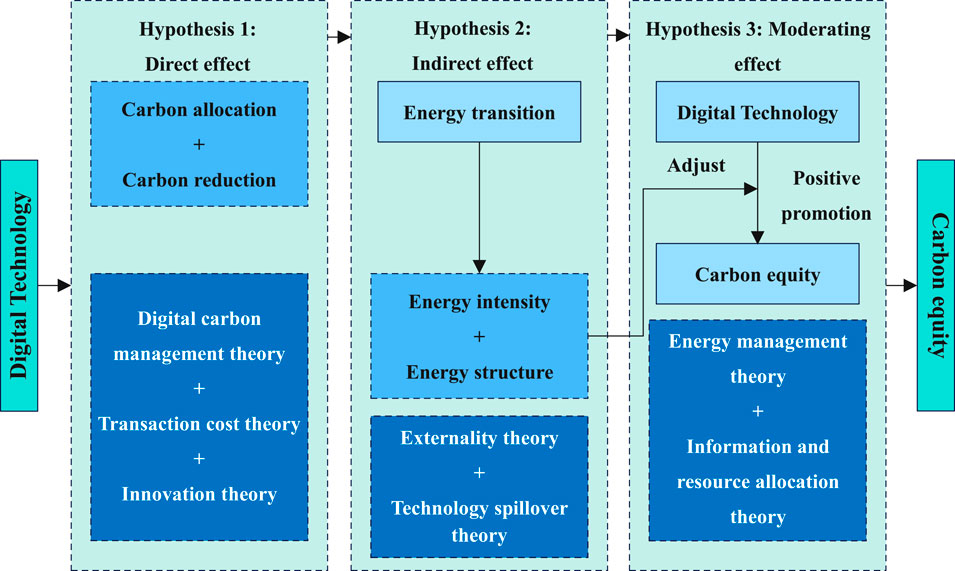
Figure 1. Diagram of the theoretical framework illustrating the influence of digital technology on carbon equity.
3 Model construction and variable measurement
3.1 Model construction
To validate the three hypotheses presented in this study, we utilize fixed effects models, mediation analysis models, and moderation analysis models to investigate the effect of digital technology on carbon equity, along with its underlying transmission mechanisms. Specifically, we introduce a digital technology index into the carbon equity analysis framework and construct the following basic regression model:
where
Furthermore, this study incorporates two intermediary variables, energy intensity (
In addition, this study uses the regulatory effect model to test the regulatory effect between digital technology and carbon equity. In this study, energy intensity (
3.2 Measurement and description of variable
3.2.1 Explained variable
This study follows the research methods of Liu and Xu (2024) and employs the carbon emission fairness index they constructed, which evaluates carbon equity from four dimensions: carbon emission responsibility, carbon emission reduction potential, carbon emission reduction capability, and carbon emission economic efficiency, as presented in Table 1. A higher value indicates greater fairness in carbon emissions compared to other regions. Specifically, from the perspective of responsibility, the region exhibits more balanced historical, per capita, and industrial carbon emissions relative to peer regions. From an industrial standpoint, this region does not exhibit imbalances in carbon emissions caused by excessive concentration of high-carbon industries or underdeveloped low-carbon industries compared to other regions. In terms of development rights and interests, this region has not lost development opportunities due to overly stringent carbon emission restrictions during its pursuit of economic growth and social progress.
3.2.2 Core explanatory variable
Drawing upon existing data, this study expands the assessment framework of digital technology by adopting the methodology from research on developing a digital technology index system (Liu and Chen, 2023). It gauges the overall development status of digital technology in different regions across four dimensions: digital infrastructure, digital trading market, digital factor inputs, and digital industry scale. Specifically, digital infrastructure is measured through internet penetration rates, internet access port density, and long-distance optical cable networks. The evaluation of the digital trading market is conducted using metrics such as the index of digital financial inclusion and the overall volume of telecommunications service. Digital factor inputs are quantified by the digital industry R&D full-time equivalent and the digital industry R&D internal expenditure. Lastly, industrial scale is assessed based on primary business revenue, enterprise counts, and employment figures within the digital sector.
Table 2 breaks down the components of the digital technology assessment framework. Given the multidimensional nature of digital technology indicators, this study employs the projection pursuit approach, which is grounded in an accelerated genetic algorithm, to quantify the digital technology index. This method involves optimizing the projection vector
In the above Equations 5-7 represents the projection index function;
3.2.3 Mediating variables and moderating variables
Drawing from the theoretical analysis outlined above, this study identifies energy intensity (
3.2.4 Control variable
Numerous internal and external factors, in addition to digital technology, exert an influence on the enhancement of the carbon equity index. To guarantee the reliability of the model’s outcomes, this study incorporates a range of control variables, including environmental policy (
3.3 Sources of data and descriptive statistic
Our research samples consist of data from 30 provinces across China, covering the period from 2013 to 2023, which were selected for this study. Data from Hong Kong, Macao, Taiwan, and Tibet were excluded due to significant gaps in energy-related information. The dataset utilized in this study was obtained from the China Statistical Yearbook and various other public sources made available by the National Bureau of Statistics. To enhance the precision and dependability of our estimates and mitigate heteroscedasticity, we applied logarithmic transformations to the relevant variables. Missing annual data for certain regions were imputed using the linear interpolation method. Descriptive statistics for the variables are presented in Table 3.
4 Empirical test and result analysis
4.1 Analysis of spatial-temporal trend evolution of digital technology index
Using the above calculation method, this study calculates the digital technology index of the sample region from 2013 to 2023, selects four-time points of 2013, 2017, 2021, and 2023, and draws the digital index map of each region, as shown in Figure 2, focusing on the spatial and temporal evolution trend of digital technology.
Regional disparities in digital technology adoption reveal a consistent pattern, with urban centers such as Beijing and Shanghai and eastern provinces including Jiangsu and Zhejiang demonstrating significantly higher adoption rates across temporal observations. Beijing, as a prominent hub for scientific and technological innovation in China, boasts a concentration of research institutions, universities, and high-tech firms. It possesses robust R&D capabilities and innovative prowess in cutting-edge digital domains, including artificial intelligence, big data analytics, and cloud computing. With its status as an international metropolis and sound financial and trade system, Shanghai has deeply integrated digital technology with financial technology, smart city, and other application scenarios, which has promoted the widespread adoption and swift advancement of digital technology. These eastern cities, benefiting from their advantageous geographical location, abundant resource endowment, and favorable policy environment, have emerged as the vanguard of digital technology development in China, steering the nation’s digital technology trajectory. The Jiangsu and Zhejiang regions, with their robust industrial economic base, furnish the necessary funding and practical application scenarios for the advancement of digital technology. Drawing upon the abundant scientific research resources of higher education institutions and leveraging an aggressive talent acquisition policy, it manages to attract a significant pool of specialized professionals. With well-developed infrastructure and a vibrant innovation ecosystem, these regions have achieved deep integration of digital technologies across industries, establishing themselves as national leaders in technological advancement. The middle region demonstrates a comparatively lower but steadily improving level of digital technology adoption relative to its eastern counterparts. As the strategy for the revitalization of the middle region is implemented in depth, the middle region has progressively increased investments in infrastructure, talent recruitment, and nurturing, fostering favorable conditions for the growth of digital technology and gradually bridging the gap with the eastern region. Conversely, the progress of digital technology in the western region demonstrates a notable disparity, trailing considerably behind, and exhibiting a more pronounced chasm in comparison to the eastern and middle regions.
From the standpoint of intra-regional variations, while the eastern region boasts a generally higher level of digital technology, disparities do exist among its internal cities. For example, the level of digital technology in Hainan and Hebei is relatively low in the eastern region. Hainan, being a prominent tourism province, has an industrial structure heavily reliant on tourism. Consequently, the scope of digital technology application scenarios is relatively narrow, and investments in digital technology research and innovation are inadequate. Although Hebei is a large economic province, its industrial structure is dominated by traditional manufacturing, and there is a significant difference in the rate and extent of digital technology development. Guangdong Province experienced significant advancements in digital technology between 2017 and 2022. Firstly, Guangdong took the lead in digital government reform in 2017. Secondly, Guangdong promotes the drive of industrial integration, accelerates the integration of digital economy and real economy, and provides broad application scenarios and practical opportunities for the development of digital technology. Finally, Guangdong continues to strengthen the construction of new information infrastructure. In 2021, the province established 46,700 new 5G base stations, accumulating a total of 170,000 stations-accounting for approximately one-eighth of the national total. By the end of 2022, Guangdong aimed to achieve more extensive 5G network coverage, thereby enhancing the hardware foundation for digital technology development. Within the middle region, there exists a disparity in the advancement of digital technologies among various cities. The capital cities of Henan, Hubei, and other provinces, with their political, economic, and cultural center status in the region, have certain advantages in the development of digital technology and can attract more resources and talent. And some relatively small cities, due to limited economic strength and resources, digital technology development is relatively slow. The difference in digital technology development between cities within the western region is even more significant. As the core province of western China, Sichuan has strong competitiveness in the growth of digital technology, which can radiate and drive the development of surrounding areas. However, remote ethnic minority areas due to underdeveloped transportation infrastructure and economic constraints, resulting in limited penetration and application of digital technologies.
In terms of temporal and spatial progression, the years spanning from 2013 to 2017 constitute a phase marked by swift expansion, during which the digital technology levels across all regions exhibited a tendency towards rapid advancement. This disparity may stem from the nation’s emphasis on the digital economy, coupled with the backing of pertinent policies, leading all regions to boost their investments in the digital technology sector. At the same time, as the Internet becomes more widespread and information technology advances rapidly, the application of digital technology in various fields continues to expand, which promotes the improvement of the level of digital technology. The years from 2017 to 2021 marked a phase of stable progress, characterized by a moderation in the speed of digital technology advancement. After the rapid development in the early stage, digital technology has achieved certain results in some fields and has begun to enter the stage of technology integration and application deepening. At the same time, it also faces some technical bottlenecks and industrial restructuring problems, which need to be further optimized and upgraded. 2021–2023 entered the differentiation adjustment period, the level of digital technology in some cities continued to grow, while the growth rate of some cities slowed down or even declined. This may be related to factors such as the adjustment of industrial structure, scientific and technological innovation ability, and policy orientation in various regions.
In conclusion, China’s digital technology development exhibits marked spatial disparities and demonstrates a gradual progression over time. To promote the comprehensive development of China’s digital economy, it is crucial to strengthen regional cooperation, augment support for the middle and western regions, and ensure balanced progression in digital technology.
4.2 Correlation analysis of carbon equity
The relationship between carbon emission and carbon equity and the data distribution between the two are visually demonstrated by constructing scatter plots. As illustrated in Figure 3, the scatter plot analysis reveals a significant inverse correlation between these variables, indicating that carbon equity decreases as carbon emissions increase. To quantify this relationship more precisely, we conducted curve fitting analysis, which yielded an influence coefficient of −0.28. This result not only confirms the negative association but also provides a precise measure of its magnitude.
First, from an economic point of view, the increase in carbon emissions is often accompanied by the acceleration of industrialization and the increase in energy consumption. However, these economic activities are not evenly distributed across all regions or groups but tend to be concentrated in specific geographic areas or social classes. This asymmetric allocation results in inequitable environmental burden-sharing, wherein certain regions or populations benefit economically while disproportionately bearing the associated environmental costs, including heightened pollution exposure and carbon emission pressures, thereby undermining carbon equity. Second, from the perspective of policy formulation and implementation, rising carbon emissions may reflect the inadequacy of policies in balancing economic development with environmental protection. Should the policy fall short of effectively steering the reduction of carbon emissions and ensuring an equitable allocation of carbon resources, it could result in a sustained increase in carbon emissions and a continuous erosion of carbon equity.
In conclusion, the inverse relationship between carbon emissions and carbon equity stems from a multitude of factors.
4.3 Pearson correlation analysis
In linear regression, the model’s estimates become biased as a result of accurate or elevated correlations among the explanatory variables. Consequently, it is necessary to conduct a collinearity assessment of the explanatory variables (see Figure 4). In this study, the Pearson correlation test is conducted for each variable, and the results are shown in the figure. A common belief is that collinearity among variables is indicated when the correlation coefficient exceeds 0.7. All correlation coefficients amongst the independent variables discussed in this study are less than 0.7, suggesting a relatively weak correlation, thus enabling the conduct of subsequent empirical tests.
4.4 Analysis of benchmark regression results
Table 4 offers the baseline regression outcomes depicting the effect of digital technologies on carbon equity. Model (1) presents the estimation outcomes for the comprehensive Chinese sample, whereas models ranging from (2) to (4) exhibit the estimations specifically for the eastern, middle, and western regions of China, respectively. In model (1), the coefficient associated with the effect of digital technology on carbon equity yields a value of 0.993, which is statistically significant at a high level. This finding implies that the progression in digital technology holds substantial promise for improving carbon equity in general. This result provides empirical support for hypothesis 1, confirming digital technology’s direct positive influence on carbon equity. With its excellent data processing, network collaboration, and intelligent analysis capabilities, digital technology can achieve horizontal and vertical leapfrog in expanding the scale of carbon equity achievements, optimize carbon trading and market mechanisms, and strengthen the internal and external information management efficiency of carbon equity entities, so as to promote the realization and deepening of carbon equity in multiple dimensions. Concerning the control variables, the elasticity coefficient of education level is 1.538. The reason is that education level encourages individuals to practice low-carbon behaviors through knowledge dissemination and cultivation of environmental awareness, leads the economic transition to low-carbon and green job creation through the improvement of labor quality, reduces the imbalance of carbon emissions caused by cognitive differences and other reasons, and helps achieve the goal of carbon equity. For each unit change in industrial structure, carbon equity will decrease by 0.639 units, which indicates that the scale effect and path dependence of traditional high-carbon industries hinder the development of low-carbon industries and the total carbon emissions remain high, which is not conducive to the realization of carbon equity. The influence coefficient of openness to the outside world on carbon equity is positive, which echoes the research results of Hao and Liu (2015), that is, an open economic environment can promote the international or regional exchange and transfer of low-carbon technologies, funds and ideas, so that different countries or regions can learn from each other’s advanced carbon emission reduction experience and introduce efficient low-carbon technology and equipment, so as to balance carbon emission levels and push for carbon equity.
According to model (2) - model (4), the effect of digital technology on carbon equity presents the research results of “middle region > western region > eastern region”. This study believes that the main reason is that in contrast to the middle and western areas, the initial level of digital technology in the eastern region is higher, and the early application of digital technology in various fields has achieved significant carbon emission reduction results. However, within the middle and western territories, digital technology still has huge application space and development potential. It has a more prominent improvement effect on the realization of carbon equity in the middle and western regions.
4.5 Endogeneity test
In the process of identifying endogenous variables, this study’s theoretical analysis reveals that digital technology facilitates the achievement of carbon equity in various dimensions, while carbon equity also acts as a crucial impetus for the progression in digital technology. Consequently, it is plausible that a bidirectional causal relationship exists between the relationship of digital technology and carbon equity, suggesting that the digital technology index may well be an endogenous variable within the model. In the endogeneity test, given that the conventional hausman test is unable to tackle the problem of heteroscedasticity, this study adopts the heteroscedasticity-robust DWH (Durbin-Wu-Hausman) test method. The results yield a statistic of 14.733 and a P-value of 0.000, suggesting the presence of endogeneity in the digital index within the model. The selection of instrumental variables adheres to two fundamental requirements: the variables must correlate with the endogenous regressor while remaining exogenous to the error term. Accordingly, this study employs two validated instruments for digital technology index: the number of fixed telephone lines per 100 inhabitants and the density of post offices per million population. Fixed telephone number per 100 people (
In this study, we further introduce the one-stage lag of carbon equity index into the model, so as to separate potential unobtainable factors and reduce the bias of model estimation. When the random disturbance term of the model has heteroscedasticity or autocorrelation, the generalized moment estimation (GMM) estimator is more effective than the 2SLS estimation, and GMM can reduce the dynamic panel bias, so this study further adopts the GMM method to estimate the corresponding dynamic panel model. Specifically, a systematic GMM estimation method is used to correct for unobservable individual heterogeneity and missing variable bias. In comparison to differential GMM, system GMM offers an effective solution to the issue of weak instrumental variables and yields time-invariant parameter estimates. Compared with horizontal GMM, this method can eliminate individual heterogeneity in the model and enhance the estimation results’ accuracy to some degree. The estimation result presented in model (7) of Table 5 pertains to the system GMM model. Initially, the outcomes of the AR test indicate that the model demonstrates first-order autocorrelation, but not second-order, implying insignificant serial correlation among the error terms in the original model. Secondly, with a P-value exceeding 0.05 in the Hansen test, it indicates that the over-identification restrictions are valid. Based on these tests, it is evident that system GMM estimation is applicable. Notably, after addressing the endogeneity issue, both model types demonstrate that digital technology has a substantial positive effect on carbon equity, further supporting hypothesis 1 of this study.
4.6 Mechanism analysis
Table 6 displays the outcomes of the intermediary mechanism by which digital technology impacts carbon equity. By examining the coefficients of influence and the significance levels of both the core and intermediary variables within the model, it becomes apparent that digital technology has an indirect influence on carbon equity, to some degree, through the mediation of energy intensity and energy structure. This provides ample support for hypothesis 2 of this study. Specifically, models (8) and (9) build upon model (1) and utilize energy intensity as an intermediary variable for conducting a stepwise regression analysis. Digital technology employs a significantly adverse effect on energy intensity, and the influence coefficient is −0.468, that is, every 1-unit change of digital technology will reduce energy intensity by 0.468 units, that is, energy utilization efficiency will increase by 0.468 units. While keeping other factors constant, a 1-unit increase in energy intensity leads to a significant decrease in carbon equity by 0.421 units. Therefore, the improvement of digital technology indirectly increased carbon equity by 0.197 units (−0.468×-0.421), representing 19.839% of the total effect. The estimation results of model (10) and model (11) reveal that energy structure optimization, acting as the intermediary variable, exerts a intermediary effect on the relationship between digital technology and carbon equity. Every 1% change in digital technology will promote the optimization level of energy structure by 1.115%, and then exert 0.336 indirect effects (−1.115×-0.301) on the realization of carbon equity, accounting for 33.837% of the total effect. Overall, digital technology exhibits a positive indirect influence on carbon equity across both pathways, suggesting that it not only impacts carbon equity directly through spillover effects but also exerts a certain degree of influence on carbon equity through various transmission channels.
4.7 Moderating effect analysis
Table 7 presents the regression outcomes concerning the moderating effect results of digital technologies on carbon equity. The analysis demonstrates that both moderators (energy intensity and energy structure) exhibit statistically significant effects at the 1% level, confirming their substantial moderating influence. Importantly, the direction of these moderating effects is negative, indicating that the relationship between digital technologies and carbon equity weakens as energy intensity or structural inefficiencies increase. The analysis reveals distinct constraining effects for each moderating variable: ①In model (12), the regression outcomes for both digital technology and energy intensity are significant at the 1% level. Specifically, the regression coefficient for digital technology is notably positive, whereas the coefficient for energy intensity is markedly negative. This is due to the fact that the index used to gauge energy intensity is negatively oriented, meaning a higher value indicates lower energy utilization efficiency. The regression coefficient associated with the interaction between digital technology and energy intensity is markedly negative. This indicates that a reduction in the negative energy intensity index has a dampening effect on the positive influence of digital technology on carbon equity. In other words, reducing energy intensity positively regulates the beneficial effect of digital technology on achieving carbon equity. It can be contended that digital technologies play a more significant role in advancing carbon equity as energy intensity decreases. ②In model (13), the variables of digital technology, energy structure, and their interaction effects all exhibit significance at the 1% level. Notably, the coefficients of digital technology and its interaction terms are of opposite signs, suggesting that an inadequate energy structure exerts a negative restraining influence on the effect of digital technology on carbon equity. The reason lies in the fact that an unreasonable energy structure leads to the rigidity of the energy supply system, limiting the stable supply and compatibility of clean energy required by digital technology. This, in turn, weakens the potential of digital technology to optimize carbon emissions in energy production, transmission, and consumption, thereby hindering the achievement of carbon equity. To more clearly depict the moderating effect of energy intensity and energy structure, this study draws the moderating effect diagram (Figure 5). When energy intensity is low and energy structure is reasonable, digital technology has a positive influence on the carbon equity effect. However, when the energy intensity is strong and the energy structure is unreasonable, the positive effect becomes negative. In general, under the influence of the two types of regulating variables, digital technology contributes to the realization of carbon equity, which further provides strong support for hypothesis 3 in this study.
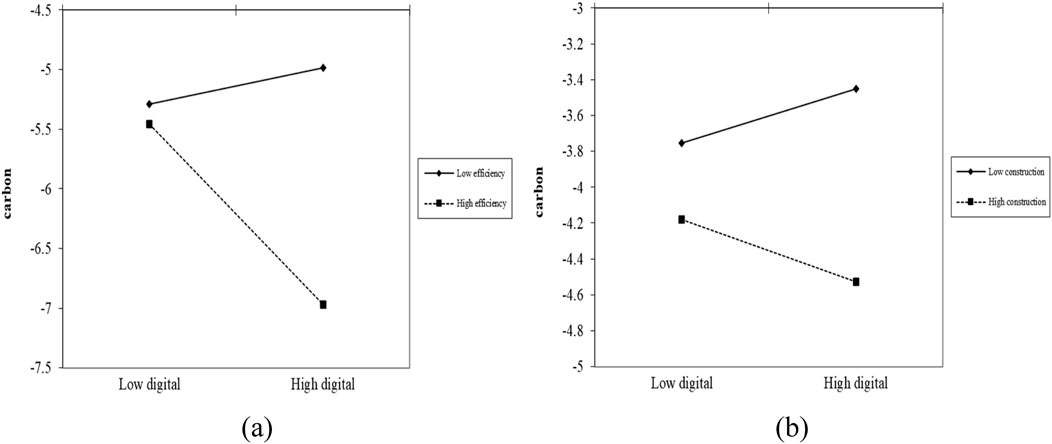
Figure 5. Moderating effect diagram (This figure shows the moderating effects at different levels of (a) energy intensity and (b) energy structure.)
4.8 Robustness test
To evaluate the dependability of the results, this study conducts comprehensive sensitivity analyses through three methodological variations: substitution of the dependent variable, reduction of control variables, and modification of the sample composition (see Table 8). To address the issue of right truncation in the sample, this study excluded the relevant variable data from 2023. The resulting model coefficients aligned with the research findings presented herein, thus confirming the robustness of the study’s model outcomes. Furthermore, this study employs the robustness testing methodology adopted by Sun and Deng (2022) by conducting a robustness verification through the reduction of control variables. Specifically, a regression analysis is conducted to explore the relationship between digital technology and carbon fairness, after excluding environmental policies from the model’s configuration. The analytical results reveal that digital technology retains a significantly beneficial impact on carbon fairness, consistent with the outcomes of the initial regression analysis. Ultimately, this study adopts the robustness testing methodology proposed by Qi and Li (2018) to modify the research samples, examine potential biases introduced by outliers, and confirm the aforementioned robustness by excluding approximately 1%, 5%, and 10% of the sample regions. The results align with previous test outcomes, suggesting that the empirical findings presented in this study are reliable and stable.
4.9 Discussion
In conclusion, the research in this study on the impact of digital technology on promoting carbon equity is not only robust in China, but also has broad applicability globally. Future research can further explore the specific practices and experiences of different countries and regions in utilizing digital technology to promote carbon equity, providing more beneficial references and lessons for achieving a fair global carbon distribution environment. This study through empirical verification reveals the mechanism of the impact of digital technology on promoting carbon equity and reaches the following conclusions:
(1) The universal impact of digital technology on promoting carbon equity.
This study has found that digital technology can effectively promote the “multi-dimensional equilibrium” and “dynamic optimization” of carbon equity. In the Chinese context, for every 1-unit increase in digital technology level, the carbon equity index significantly increases by 0.993 units, and this effect remains significant among the eastern, middle, and western regions of China. This conclusion demonstrates cross-regional validity, extending beyond the Chinese context due to its fundamental growth logic and operational mechanisms. Digital technology’s capacity for efficient information integration and data processing facilitates real-time emissions monitoring and dynamic performance assessment by both corporate and governmental entities (Shen and Tan, 2022). Digital technology can break down information barriers by establishing information sharing platforms, enhance the accuracy and effectiveness of environmental supervision, and promote the realization of carbon equity. This capability of digital technology is not limited by geographical location or industrial scale, and the mechanism it promotes for carbon equity governance has universal laws applicable worldwide. For instance, Canada has integrated multiple sources of data through the “Digital Climate Action Platform” to optimize the allocation of carbon taxes, establishing a more reasonable carbon allocation scheme, and effectively promoting the construction of carbon equity. The digital technology in Germany’s Industry 4.0 system has achieved precise optimization of carbon monitoring records throughout the production, transmission, and consumption chains, significantly improving the accuracy of carbon responsibility allocation. These cross-national implementations validate the consistent positive relationship between digital technology adoption and carbon equity enhancement, suggesting its potential replicability in other regional contexts.
(2) Digital technology indirectly affects carbon equity from a global perspective through energy intensity and energy structure.
Digital technology not only has a direct driving effect on carbon equity, but also can indirectly promote it by optimizing energy intensity and energy structure. With the deep penetration of digital technology, it utilizes its efficient allocation function to significantly improve energy utilization efficiency. The “Digital Action Plan for Energy Systems” of the European Union in 20231 achieved real-time power load prediction and cross-domain scheduling among member states, promoting an average annual reduction of 3.7% in energy consumption per unit of GDP, significantly alleviating the imbalance of carbon burden in energy-poor areas caused by high energy consumption. At the level of energy structure transformation, digital technology significantly optimizes the energy structure through precise analysis and planning functions, promoting the green transformation of energy and effectively achieving carbon equity. Taking Japan as an example, in the development of hydrogen energy, by using digital technology to analyze the energy demand characteristics of different regions and precisely planning the hydrogen energy layout, hydrogen energy can be more efficiently covered to remote areas such as Tokushima Prefecture, Shiga Prefecture, and Kobe Port Island, which have a single energy structure and high carbon emissions, increasing the proportion of clean energy in these areas and narrowing the carbon equity gap caused by regional differences in energy structure.
(3) The moderating role of digital technology in promoting a carbon-inequity-free energy transition.
The research reveals that the promoting effect of digital technology on carbon equity exhibits a significant threshold characteristic, and its moderating effect is constrained by both energy intensity and energy structure. At the energy intensity regulation level, when the energy intensity drops below a certain value, the enabling effect of digital technology can unleash a “multiplier effect”, significantly reducing the carbon emission intensity of high-energy-consuming industries and markedly narrowing the carbon efficiency gap between regions (Ardolino et al., 2025). Finland’s “Finnish Forestry 2030 Strategy”2 empowers the clustered development of the forestry industry through digital technology. When the energy intensity drops below 0.8 tons of oil equivalent per million euros, the digital technology triggers the “multiplier effect”. This significantly reducing the industry’s carbon emission intensity and narrowing the regional carbon efficiency gap. In the energy structure regulation dimension, when the proportion of clean energy in the energy consumption structure exceeds a certain value, digital technology can significantly enhance the utilization rate of clean energy, promote regional clean energy sharing, and reduce carbon emissions through structural optimization, balancing the phenomenon of large carbon emission gaps. After the proportion of clean energy exceeds 50%, Australia uses digital technology to facilitate cross-regional transactions, raising the clean energy utilization rate to 85%,3 promoting widespread clean energy sharing and achieving carbon equity.
The research further reveals that digital technology plays a fundamental and revolutionary enabling role in the process of achieving global carbon equity. With the addition of energy factors, the effectiveness of digital technology has also significantly increased. This new paradigm of technology empowering carbon equity not only provides scientific technical means for accurately measuring the responsibilities and contributions of different entities in responding to climate change, but also offers solid power support for building a more stable and effective governance system within the framework of global climate governance and ecological common prosperity in the process.
5 Conclusion and suggestions
Drawing upon the achievement of carbon fairness facilitated by digital technology, this study elucidates the influence of digital technology on the attainment of carbon fairness through three perspectives: basic effect, transmission mechanism, and regulatory effect utilizing China’s provincial panel data spanning from 2013 to 2023. After constructing a quantitative index for digital technology that includes dimensions such as digital infrastructure, digital trading markets, digital factor inputs, and the size of the digital industry, this study utilizes panel fixed-effects models, as well as mediation and moderation analyses, to explore the complex interplay between digital technology and carbon equity at the national, regional (covering the three primary regions), and provincial levels. The key findings are summarized below: (1) The advancement of digital technology can significantly contribute to achieving carbon equity in China, exhibiting a spatial pattern of “middle region > western region > eastern region”. It has emerged as a crucial force in addressing the challenges of carbon equity. After incorporating instrumental variables and employing both two-stage least squares and systematic GMM regression methods, the findings maintain their robustness. (2) Digital technology plays a substantial, albeit indirect, role in attaining carbon equity by lowering energy intensity and enhancing the energy structure, ultimately aiding in the achievement of carbon equity. (3) Digital technology exerts a notable moderating impact on the attainment of carbon equity. In regions with relatively low energy intensity, digital technology exerts a more pronounced influence on realizing carbon equity. Moreover, in areas with a more optimized energy mix, digital technology has the potential to play an even greater role in advancing carbon fairness.
The findings of this study carry policy implications that are crucial for fully unveiling the carbon equity benefits of digital technology:
(1) The prior research indicated that the beneficial impact of digital technologies on carbon fairness varies across different regions. For the middle region, where the facilitative effect is most pronounced, the government should enhance policy support by establishing a dedicated digital technology development fund. This fund should prioritize investments in digital infrastructure, including the expansion and upgrading of 5G base stations and data centers. Furthermore, collaborative efforts between universities and enterprises should be encouraged to jointly cultivate digital technology professionals, thereby providing essential human capital for the growth of the digital technology industry. Additionally, preferential tax policies have been implemented to attract digital technology enterprises to establish research and development centers or industrial bases in the middle region. This will facilitate the widespread application of digital technology across various sectors and reinforce its role in promoting carbon equity. The western region should proactively establish a digital technology exchange and cooperation mechanism with the eastern region, developing a digital technology integration platform between the east and west through government guidance and enterprise participation. Firstly, this initiative aims to introduce advanced digital technologies and management practices from the eastern region to facilitate the digital transformation of local traditional industries. Secondly, it seeks to leverage the region’s own resources to attract investment from eastern digital technology enterprises, fostering the joint advancement of digital technology applications tailored to the western region, thereby enhancing the beneficial effect of digital technology on carbon equity. Although the role of digital technology in promoting carbon equity is currently limited in the eastern region, as a leading area in digital technology development, emphasis should be placed on advancing high-end innovative applications of digital technology for carbon reduction. It is necessary to augment funding for the exploration and advancement of cutting-edge technologies, like AI and blockchain, across areas such as carbon accounting, emissions trading, and environmental footprint tracking. Encouragement should be provided for scientific research institutions and enterprises to collaborate on addressing key challenges, thereby developing internationally competitive digital technology solutions for carbon reduction. This methodology will facilitate the realization of the latent worth of digital technology in promoting carbon fairness in the eastern region.
(2) The previous study revealed that the energy transition exerts a significant facilitation effect on achieving carbon equity through digital technology. Consequently, by reducing energy intensity, national-level policies should be established to set clear targets and implementation guidelines for energy intensity reduction across various industries. This would incentivize companies to utilize digital technologies for the establishment of energy management systems, facilitating the real-time tracking of energy consumption data. By employing sophisticated technologies, including big data analytics and AI, these systems can enhance energy utilization processes and attain meticulous energy management control. For instance, the promotion of intelligent manufacturing technologies in the industrial sector, utilizing digital twins to simulate and optimize production processes, can enhance energy efficiency, decrease energy intensity, and thereby promote carbon equity. Simultaneously, we will bolster our backing for the utilization of digital technologies within the clean energy industry. By leveraging fiscal subsidies, tax incentives, and other policy measures, enterprises will be encouraged to adopt digital technologies to enhance the efficiency of clean energy production, storage, and transmission. For instance, big data and Internet of things technologies can be utilized to optimize the layout and scheduling of wind and photovoltaic power generation, thereby increasing the proportion of renewable energy within the overall energy mix. Furthermore, leveraging digital technology to create an energy market exchange will enable efficient distribution of clean energy resources, foster advancements in energy structure optimization, and ultimately aid in the attainment of carbon fairness.
(3) Prior research has shown that the energy intensity and composition have notable moderating impacts. Consequently, in regions characterized by lower energy intensity, the deep integration of digital technologies and low-carbon industries should be further intensified. A dedicated fund for innovation at the intersection of digital technology and low-carbon industries will be established to motivate companies to innovate and implement low-carbon technologies driven by digital advancements. For instance, this initiative will support enterprises in utilizing digital technology to develop new energy-saving materials, optimize building energy efficiency systems, and promote regional industries towards a higher level of low-carbon development. The aim of this methodology is to optimize the utilization of digital technology with the purpose of advancing carbon equity. For regions possessing a balanced energy mix, it is crucial to bolster the policy framework that supports the utilization of digital technologies. Establish comprehensive regulations and standards to govern the implementation of digital technologies in the energy sector, ensuring data security and privacy. Additionally, promoting collaboration between energy enterprises and digital technology firms by forming industrial alliances. These alliances should jointly undertake energy digital transformation projects, leveraging digital technologies to elevate the intelligence level of the energy system and further amplify the positive impact of digital technologies on carbon equity. Through the comprehensive implementation of the aforementioned multi-dimensional policy measures, it is anticipated that the full potential of digital technology will be harnessed, thereby facilitating the resolution of carbon equity challenges and promoting sustainable and inclusive development in China and the global low-carbon transition. However, this study does have certain limitations, which will serve as key areas for our team’s future research: Primarily, the study restricts its analysis to China as the research subject, omitting an examination of the global impact of digital technology on carbon equity. Global carbon emission reduction is an issue that requires international cooperation. The status of carbon equity and the levels of digital technology development exhibit considerable variation among nations. Therefore, the absence of international comparisons limits our ability to fully understand the universal principles and unique characteristics of how digital technology promotes carbon equity. In future research, the team will strive to incorporate international data and analyze the differences in models and pathways through which digital technology fosters carbon equity under varying political systems, economic development levels, and cultural contexts, thereby providing more valuable recommendations for global carbon emission reduction efforts. Second, this study primarily concentrates on the positive impacts of digital technology on carbon equity while giving limited attention to potential negative effects associated with its development. Furthermore, the manufacturing and utilization of digital technologies consume energy and resources, thereby generating carbon emissions. Additionally, the implementation of digital technologies might create a new digital divide, further widening disparities in the capacity of different regions to achieve carbon reduction and carbon equity. To provide a more comprehensive analysis, we will explore the “green paradox” of digital technology to better elucidate its influence on environmental governance.
Data availability statement
The datasets presented in this article are not readily available because the research data in this paper is limited by the current research project, the original data cannot be provided for the time being. Requests to access the datasets should be directed to Chaoyang Li, ZzAxMTgyNEAxNjMuY29t.
Author contributions
LZ: Writing – review and editing, Conceptualization, Supervision. YW: Writing – review and editing, Writing – original draft. YG: Methodology, Writing – review and editing. CL: Funding acquisition, Writing – review and editing.
Funding
The author(s) declare that financial support was received for the research and/or publication of this article. This work was supported by the National Natural Science Foundation of China General Program (71974046).
Acknowledgments
We are very grateful to editors and reviews for reviewing this paper.
Conflict of interest
Author LZ was employed by China State Shipping Corporation Limited.
The remaining authors declare that the research was conducted in the absence of any commercial or financial relationships that could be construed as a potential conflict of interest.
Generative AI statement
The author(s) declare that no Generative AI was used in the creation of this manuscript.
Publisher’s note
All claims expressed in this article are solely those of the authors and do not necessarily represent those of their affiliated organizations, or those of the publisher, the editors and the reviewers. Any product that may be evaluated in this article, or claim that may be made by its manufacturer, is not guaranteed or endorsed by the publisher.
Footnotes
1https://ec.europa.eu/commission/presscorner/detail/en/IP_22_6228.
2https://mmm.fi/en/forest-strategy.
3http://arena.gov.au/projects/advanced-energy-trading-platforms/.
References
Acemoglu, D., Aghion, P., Bursztyn, L., and Hemous, D. (2012). The environment and directed technical change. Am. Econ. Rev. 102 (1), 131–166. doi:10.1257/aer.102.1.131
Ardolino, M., Bino, A., Ciano, P. M., and Bacchetti, A. (2025). Enabling digital capabilities with technologies: a multiple case study of manufacturing supply chains in disruptive times. Systems 13 (1), 39. doi:10.1016/j.techfore.2021.120795
Bastida, L., Cohen, J. J., Kollmann, A., Moya, A., and Reichl, J. (2019). Exploring the role of ICT on household behavioural energy efficiency to mitigate global warming. Renew. Sustain. Energy Rev. 103, 103455–103462. doi:10.1016/j.rser.2019.01.004
Buhe, C. L., and Chen, L. (2021). Industrial policy in the digital age: a case study of constructing new infrastructure. Forum Sci. Technol. China (09), 31–41. doi:10.13580/j.cnki.fstc.2021.09.005
Cao, S. P., Nie, L., Sun, H. P., Sun, W., and Taghizadeh-Hesary, F. (2021). Digital finance, green technological innovation and energy-environmental performance: evidence from China’s regional economies. J. Clean. Prod. 327, 129458. doi:10.1016/J.JCLEPRO.2021.129458
Ceccobelli, M., Gitto, S., and Mancuso, P. (2012). ICT capital and labour productivity growth: a non-parametric analysis of 14 OECD countries. Telecommun. Policy 36 (4), 282–292. doi:10.1016/j.telpol.2011.12.012
Chen, P. Y. (2022). Is the digital economy driving clean energy development? - new evidence from 276 cities in China. J. Clean. Prod. 372, 133783. doi:10.1016/j.jclepro.2022.133783
Dogan, A., and Pata, U. K. (2022). The role of ICT, R&D spending and renewable energy consumption on environmental quality: testing the LCC hypothesis for G7 countries. J. Clean. Prod. 380, 135038. doi:10.1016/J.JCLEPRO.2022.135038
Fan, Y., Yan, X. L., Cui, L. B., Zhang, L., and Wang, J. (2023). Carbon pricing, carbon equity, and the RCEP framework. China Econ. Rev. 80, 102017. doi:10.1016/J.CHIECO.2023.102017
Gao, D., Li, G., and Yu, J. Y. (2022). Does digitization improve green total factor energy efficiency? — Evidence from Chinese 213 cities. Energy 247, 123395. doi:10.1016/j.energy.2022.123395
Guo, F., Yang, S. G., and Ren, Y. (2022). The digital economy, green technology innovation and carbon emissions—empirical evidence from Chinese city-level data. J. Shaanxi Normal Univ. Philosophy Soc. Sci. Ed. 51 (03), 45–60. doi:10.15983/j.cnki.sxss.2022.0507
Han, D. R., Li, M. M., and Lu, K. (2025). Digital platforms enabling carbon neutral technology innovation: based on market incentives and government constraints. Humanit. Soc. Sci. Commun. 12 (1), 355–17. doi:10.1057/s41599-025-04691-5
Hao, Y., and Liu, Y. M. (2015). Effects of foreign business on carbon emission in China: a provincial panel data-based analysis. Chin. J. Environ. Manag. 7 (04), 85–93. doi:10.3969/j.issn.1674-6252.2015.04.040
Huang, P., and Chen, X. H. (2024). The impact of data factor-driven industry on the green total factor productivity: evidence from the China. Sci. Rep. 14 (1), 25377. doi:10.1038/S41598-024-77189-W
Huang, Q. H., Yu, Y. Z., and Zhang, S. L. (2019). Internet development and productivity growth in manufacturing industry: internal mechanism and China experiences. Chin. J. Environ. Manag. (08), 5–23. doi:10.19581/j.cnki.ciejournal.2019.08.001
Hubacek, K., Baiocchi, G., Feng, K. S., and Patwardhan, A. (2017). Poverty eradication in a carbon constrained world. Nat. Commun. 8 (1), 912. doi:10.1038/s41467-017-00919-4
Jia, Z. J. (2023). The hidden benefit: emission trading scheme and business performance of downstream enterprises. Energy Econ. 117, 106488. doi:10.1016/J.ENECO.2022.106488
Jing, S., Wu, F. J., Shi, E. Y., Wu, X., and Du, M. (2023). Does the digital economy promote the reduction of urban carbon emission intensity? Environ. Res. Public Health 20 (4), 3680. doi:10.3390/ijerph20043680
Lange, S., Pohl, J., and Santarius, T. (2020). Digitalization and energy consumption. Does ICT reduce energy demand? Ecol. Econ. 176, 106760. doi:10.1016/j.ecolecon.2020.106760
Li, C. B., Bai, M. R., and Dong, J. (2025). Evolutionary game of Beijing-Tianjin-Hebei regional synergistic carbon emission reduction under carbon neutrality target. Environ. Sci., 1–18. doi:10.13227/j.hjkx.202410111
Li, L. S., and Zhou, Y. (2006). Can technological advances improve energy efficiency? —based on the empirical test of China’s industrial sector. Manag. World (10), 82–89. doi:10.19744/j.cnki.11-1235/f.2006.10.010
Li, R., Rao, J., and Wan, L. Y. (2022). The digital economy, enterprise digital transformation, and enterprise innovation. Manag. Decis. Econ. 43 (7), 2875–2886. doi:10.1002/mde.3569
Liao, Z. Z., and Ru, S. F. (2024). The impact of digital technology innovation on the optimization of the energy structure of Chinese cities: from the perspective of factor-biased technological progress. Resour. Sci. 46 (9), 1881–1892. doi:10.18402/resci.2024.09.16
Lin, B. Q., and Zhao, H. S. (2023). Evaluating current effects of upcoming EU Carbon Border Adjustment Mechanism: evidence from China’s futures market. Energy Policy 177, 113573. doi:10.1016/J.ENPOL.2023.113573
Liu, J. L., and Chen, Y. Y. (2023). Digital technology development, temporal and spatial effects, regional carbon emission. Stud. Sci. Sci. 41 (05), 841–853. doi:10.3969/j.issn.1003-2053.2023.05.008
Liu, Z. H., and Xu, J. W. (2024). The influence and mechanism of carbon trading pilot on provincial carbon emissions equity: empirical analysis based on multi-period DID, spatial DID and intermediary effect. J. Nat. Resour. 39 (03), 697–711. doi:10.31497/zrzyxb.20240312
Niu, H. X., and Hu, J. Y. (2011). Empirical research on relationship between FDI and CO2 emissions in China. J. Int Trade (05), 100–109. doi:10.13510/j.cnki.jit.2011.05.003
Pettifor, H., and Wilson, C. (2020). Low carbon innovations for mobility, food, homes and energy: a synthesis of consumer attributes. Renew. Sustain. Energy Rev. 130, 109954. doi:10.1016/j.rser.2020.109954
Qi, S. Z., and Li, Y. (2018). Threshold effects of renewable energy consumption on economic growth under energy transformation. China Popul. Resour. Environ. 28 (2), 19–27. doi:10.12062/cpre.20170905
Qing, L. L., Ji, Z., and Zhang, W. Y. (2024). Research on the synergistic effect of pollution reduction and carbon reduction in the application of enterprise digital technology. Theory Pract. Finance Econ. 45 (04), 136–143. doi:10.16339/j.cnki.hdxbcjb.2024.04.017
Schneider, U. A., and Smith, P. (2009). Energy intensities and greenhouse gas emission mitigation in global agriculture. Energy Effic. 2 (2), 195–206. doi:10.1007/s12053-008-9035-5
Seriño, M. N. V. (2020). Rising carbon footprint inequality in the Philippines. Environ. Econ. Policy Stud. 22, 173–195. doi:10.1007/s10018-019-00253-7
Shen, M. H., and Tan, W. J. (2022). Digitalization and green innovation performance of enterprises: identification of Double effects based on Increment and quality improvement. South China J. Econ. (09), 118–138. doi:10.19592/j.cnki.scje.391819
Song, M., and Liu, X. Y. (2023). Innovation infrastructure to drive carbon emission reduction in manufacturing: mechanisms and evidence. J. Nanjing Univ. Philosophy, Humanit. Soc. Sci. 60 (06), 112–126. doi:10.3969/j.issn.1007-7278.2023.06.010
Sun, H., and Deng, Y. Y. (2022). The effect of “Reducing Pollution and Carbon Emissions” in environmental policy: a study based on the perspective of pollution fee collection. Econ. Issues China (03), 115–129. doi:10.19365/j.issn1000-4181.2022.03.07
Tian, P. P., Ma, H. Y., Zhang, Z. Y., and Yu, Y. (2025a). China's current carbon inequality is predominantly determined by capital disparity. Ecol. Econ. 230, 108515. doi:10.1016/j.ecolecon.2024.108515
Tian, Q., Zhao, T., and Yuan, R. (2021). An overview of the inequality in China’s carbon intensity 1997-2016: a theil index decomposition analysis. Clean Technol. Environ. Policy 23, 1581–1601. doi:10.1007/S10098-021-02050-X
Tian, X. J., Sun, R. Q., and Lu, C. L. (2025b). Impact of digital technology spatial correlation network on urban carbon emission reduction: based on the perspective of network node centrality. Environ. Sci., 1–19. doi:10.13227/j.hjkx.202409198
Wang, B., Gong, S. Y., and Yang, Y. (2024). Unveiling the relation between digital technology and low-carbon innovation: carbon emission trading policy as an antecedent. Technol. Forecast. & Soc. Change 205, 205123522–123522. doi:10.1016/J.TECHFORE.2024.123522
Wang, C., and Lin, B. (2023). Managing carbon efficiency and carbon equity: what information do we have from embodied carbon emissions? J. Glob. Inf. Manag. 31 (1), 1–22. doi:10.4018/JGIM.334360
Wang, Y. A., Fang, X. L., Yin, S. W., and Chen, W. (2021). Low-carbon development quality of cities in China: evaluation and obstacle analysis. Sustain. Cities Soc. 64, 102553. doi:10.1016/j.scs.2020.102553
Wu, S. M., and Chen, Z. M. (2023). Carbon inequality in China: evidence from city-level data. China Econ. Rev. 78, 101940. doi:10.1016/J.CHIECO.2023.101940
Wu, T., Peng, Z. H., Yi, Y., and Chen, J. (2023). The synergistic effect of digital economy and manufacturing structure upgrading on carbon emissions reduction: evidence from China. Environ. Sci. Pollut. Res. 30 (37), 87981–87997. doi:10.1007/S11356-023-28484-Y
Yuan, H. W., and Gao, B. (2022). The development of digital economy and the improvement of high-tech industry innovation efficiency: empirical test based on China’s provincial panel data. Sci. & Technol. Prog. Policy 39 (10), 61–71. doi:10.6049/kjjbydc.2021090087
Zhang, J. N., Lyu, Y. W., Li, Y. T., and Geng, Y. (2022). Digital economy: an innovation driving factor for low-carbon development. Environ. Impact Assess. Rev. 96, 106821. doi:10.1016/J.EIAR.2022.106821
Zhang, Y., and Huang, H. (2023). The impact of digital economy development on inequity of carbon emissions. Resour. Sci. 45 (6), 1223–1238. doi:10.18402/resci.2023.06.10
Keywords: digital technology, carbon equity, energy intensity, energy structure, the moderating model
Citation: Zhang L, Wang Y, Geng Y and Li C (2025) Sustainability of carbon: research on the impact of digital technology development on carbon equity. Front. Environ. Sci. 13:1593632. doi: 10.3389/fenvs.2025.1593632
Received: 14 March 2025; Accepted: 06 June 2025;
Published: 02 July 2025.
Edited by:
Luan Santos, Federal University of Rio de Janeiro, BrazilReviewed by:
Narendra Singh, British Geological Survey, United KingdomPeipei Tian, Shandong University, China
Copyright © 2025 Zhang, Wang, Geng and Li. This is an open-access article distributed under the terms of the Creative Commons Attribution License (CC BY). The use, distribution or reproduction in other forums is permitted, provided the original author(s) and the copyright owner(s) are credited and that the original publication in this journal is cited, in accordance with accepted academic practice. No use, distribution or reproduction is permitted which does not comply with these terms.
*Correspondence: Chaoyang Li, ZzAxMTgyNEAxNjMuY29t
 Liyao Zhang1,2
Liyao Zhang1,2 Yingying Geng
Yingying Geng
